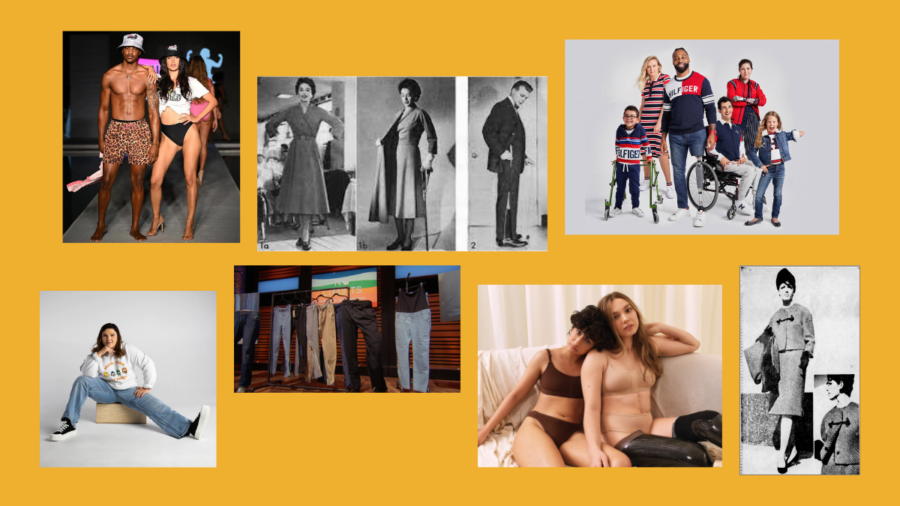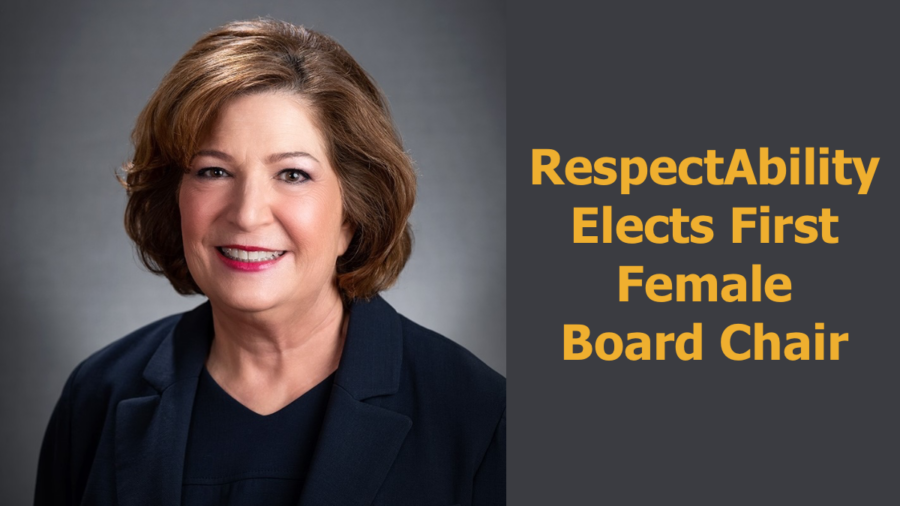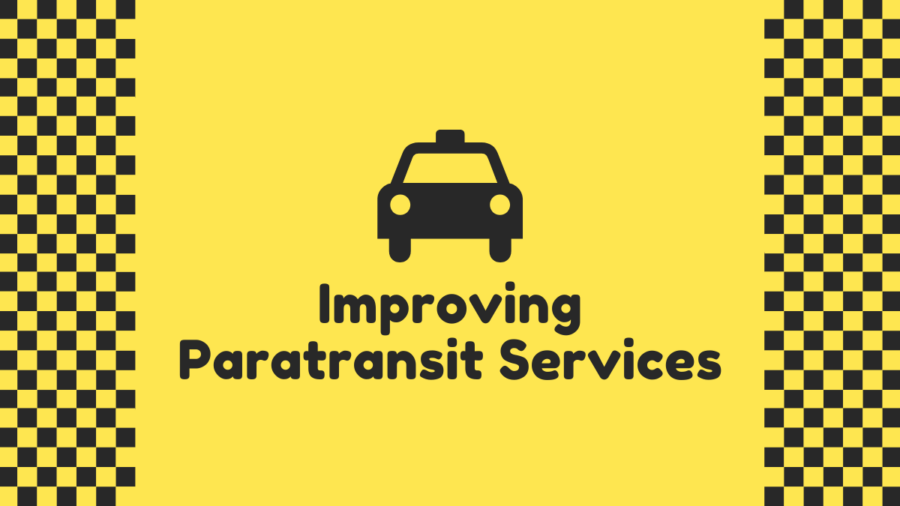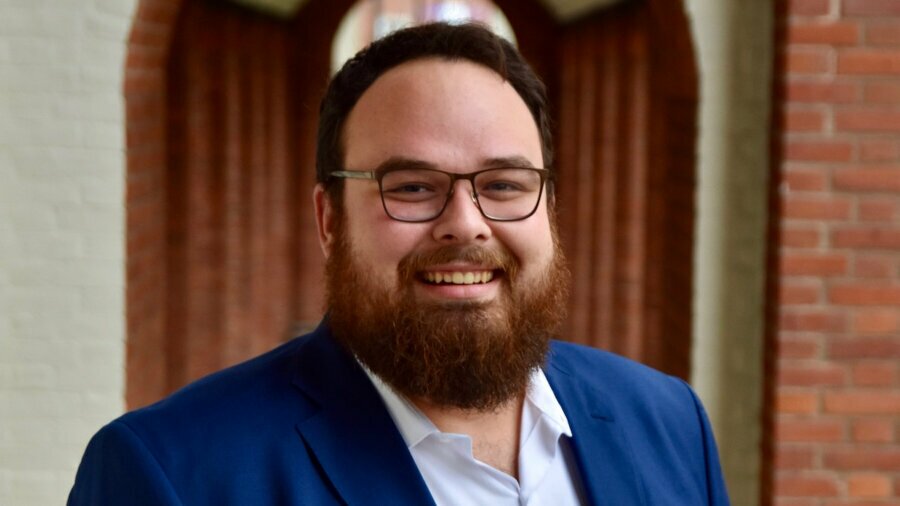 Ben Spangenberg began as a Fellow in our National Leadership Program shortly after I started working at RespectAbility. By 2017, he was managing the National Leadership Program. Ben truly gave his all when working with Fellows. He knew personally how it felt to be discriminated against in the workplace due to a disability, and he not only fought hard to help change the landscape for future individuals but also imparted his “Benly wisdom” to more than 200 Fellows who came through the program under his tutelage. He has helped countless people learn how to advocate for themselves – especially in terms of disability accommodations. His legacy will live on in the dozens of Fellows he mentored – reviewing resumes, conducting mock interviews, and connecting them to a vast network within the disability community. [continue reading…]
Ben Spangenberg began as a Fellow in our National Leadership Program shortly after I started working at RespectAbility. By 2017, he was managing the National Leadership Program. Ben truly gave his all when working with Fellows. He knew personally how it felt to be discriminated against in the workplace due to a disability, and he not only fought hard to help change the landscape for future individuals but also imparted his “Benly wisdom” to more than 200 Fellows who came through the program under his tutelage. He has helped countless people learn how to advocate for themselves – especially in terms of disability accommodations. His legacy will live on in the dozens of Fellows he mentored – reviewing resumes, conducting mock interviews, and connecting them to a vast network within the disability community. [continue reading…]
News
Remembering Ben Spangenberg’s Light
 Ben and I worked for the same organization, but we chose to be friends and work-siblings! I will cherish our goofy conversations, our joyful chats, our sad times, and our shared love of all the Fellows who came through our program.
Ben and I worked for the same organization, but we chose to be friends and work-siblings! I will cherish our goofy conversations, our joyful chats, our sad times, and our shared love of all the Fellows who came through our program.
Some of our funniest conversations had our beloved cats involved. I remember helping Ben use a lint roller on his then-new wheelchair because a certain little Miss Madison had decided she liked his new orange wheels! We both had fur all over us, and we just started laughing so loudly that we interrupted a meeting in the office next door and got shushed. Which made us laugh even more (after we shut the office door!). [continue reading…]
The Past, Present, and Future of Adaptive Fashion
What do you think about when you are shopping for clothes? Maybe you like wearing specific colors, or have a go-to brand, or perhaps you are thinking about a special event. For many disabled people, while all of that is important to take into consideration, many other factors go into deciding whether to purchase an item of clothing. A pair of jeans might look great on the rack, but how easy are they to put on? Can the buttons on that shirt be fastened without needing to ask for assistance? This outfit looks great, but are the seams and the fabric sensory-friendly? These questions just scratch the surface of the problems that the adaptive fashion industry is trying to solve.
Adaptive fashion is clothing modified with certain features to fit the needs of disabled consumers. There are various types of adaptive clothes to cater to the different types of disabilities. [continue reading…]
RespectAbility Elects First Female Board Chair, Adds New Executive Committee and Board Members
Los Angeles, July 27 – As RespectAbility enters its second decade fighting stigmas and advancing opportunities, the organization is proud to announce that Linda L. Burger has been elected as its first female Chair of the Board of Directors. Additionally, Christine Cadena and Paul Martin have been elected to the Board of Directors after serving on the organization’s Advisory Council. Cadena has joined the Executive Committee as a Vice Chair, alongside continuing Vice Chairs Vivian Bass and Delbert Whetter. Craig Leen has joined the Executive Committee as Secretary, and Khadija Bari remains Treasurer. Shelley Cohen remains on the Executive Committee as an at-large member.

Ollie Cantos
Ollie Cantos is staying on the Executive Committee as the Immediate Past Chair. “I am filled with intense gratitude for having had the privilege of being at the helm of RespectAbility over the past two years, and it is my honor to join the ranks of Donn Weinberg, Calvin Harris, and Steve Bartlett as Chairs Emeriti,” said Cantos. “I am grateful to pass the baton to a new leader, who will surely build on our solid history as we tackle a future that is extraordinarily bright with promise and possibility.”

Linda Burger
Linda L. Burger has served on RespectAbility’s Board since 2016; she was elected Treasurer in 2018. Her professional life has been devoted to leading and shaping a robust resume of work in the Houston Jewish community, most recently in creating significant social service programs as CEO of Jewish Family Service of Houston, from which she retired in 2022. Since becoming CEO in 2005, Burger and her team instituted game-changing initiatives that transformed and expanded the agency’s ability to respond to basic needs and community emergencies and focus on erasing stigmas associated with disability and mental health issues. Her leadership on inclusion of and advocacy for people with disabilities and the prevention of suicide and substance misuse has received national recognition. [continue reading…]
Self-Employment Update: Secrets to Texas’s Success
The heart of RespectAbility’s self-employment project is a collaborative gathering of best practices and resources. Like most collaborative processes, the project has many moving parts, but that doesn’t mean that we need to wait to start sharing the information with our readers. RespectAbility Policy Fellow Audrey Bayne has invested significant time and energy learning about state Vocational Rehabilitation (VR) self-employment programs. Below, she briefly describes how Texas is leading the way.
The national Office of Disability Employment Policy (ODEP) argues that the inherent flexibility of self-employment is often a better match for people with disabilities than traditional “nine to five” employment, making them more likely to retain their employment status. VR clients whose cases end in self-employment make an average of nearly 80% more income than their peers who obtain traditional competitive integrated employment (CIE). Despite self-employment providing significantly more flexibility and income than traditional CIE, many states’ VR offices are not adequately equipped to assist their clients in pursuing this kind of employment.
In fact, despite its significant benefits, nationally only 1.7% of VR cases end in self-employment. Virginia Commonwealth University’s Rehabilitation Research and Training Center surveyed several hundred VR employees and found that a majority of those employed by state Vocational Rehabilitation offices did not feel adequately equipped to assist their clients in seeking self-employment. RespectAbility’s self-employment project is looking at the successes of different states, in the hopes that we can all learn from each other.
One standout state in the area of self-employment for VR clients is Texas. In 2019, 9.1% of Texas clients’ cases closed in self-employment, more than five times the national average. There appear to be some secrets to Texas’ success. [continue reading…]
Eliminating The Subminimum Wage
As a final project for her Spring Fellowship, Policy Fellow Emily Snodderly wrote and delivered this policy speech examining the practice of paying subminimum wages to people with disabilities.
 In 1938, the Fair Labor Standards Act created the federal minimum wage, but it included an exception for people with disabilities. The exception was intended to preserve employment opportunities for people, especially wounded veterans, who couldn’t keep up with “normal production” in factories. Now, 85 years later, thanks to this law, an estimated 53,000 workers in the United States earn less than minimum wage, sometimes pennies per hour, solely because they have a disability.
In 1938, the Fair Labor Standards Act created the federal minimum wage, but it included an exception for people with disabilities. The exception was intended to preserve employment opportunities for people, especially wounded veterans, who couldn’t keep up with “normal production” in factories. Now, 85 years later, thanks to this law, an estimated 53,000 workers in the United States earn less than minimum wage, sometimes pennies per hour, solely because they have a disability.
This is the typical experience of a worker with a disability earning subminimum wage. We’ll call her Janet. Janet is a 35-year-old woman with an intellectual disability. For the last 15 years, she has worked in something called a sheltered workshop. Like Janet, all her coworkers have some sort of disability. For 10 hours a week, they sort and package products like jewelry or soap. Every 6 months, Janet’s supervisor times how fast she works in order to justify her current wage. She earns $4 an hour–about average for sheltered workshop employees. After an entire year of sorting and packaging the same way every day, Janet has earned a grand total of $2,000.
Oftentimes, when I first tell someone about subminimum wage employment, their reaction is positive. They say, “Isn’t that a good thing? If employers can pay lower wages, it incentivizes them to hire people with disabilities. Plus, people who couldn’t otherwise get a job get the satisfaction of having a job.” However, this perspective is based on two false assumptions. [continue reading…]
Improving Paratransit Services
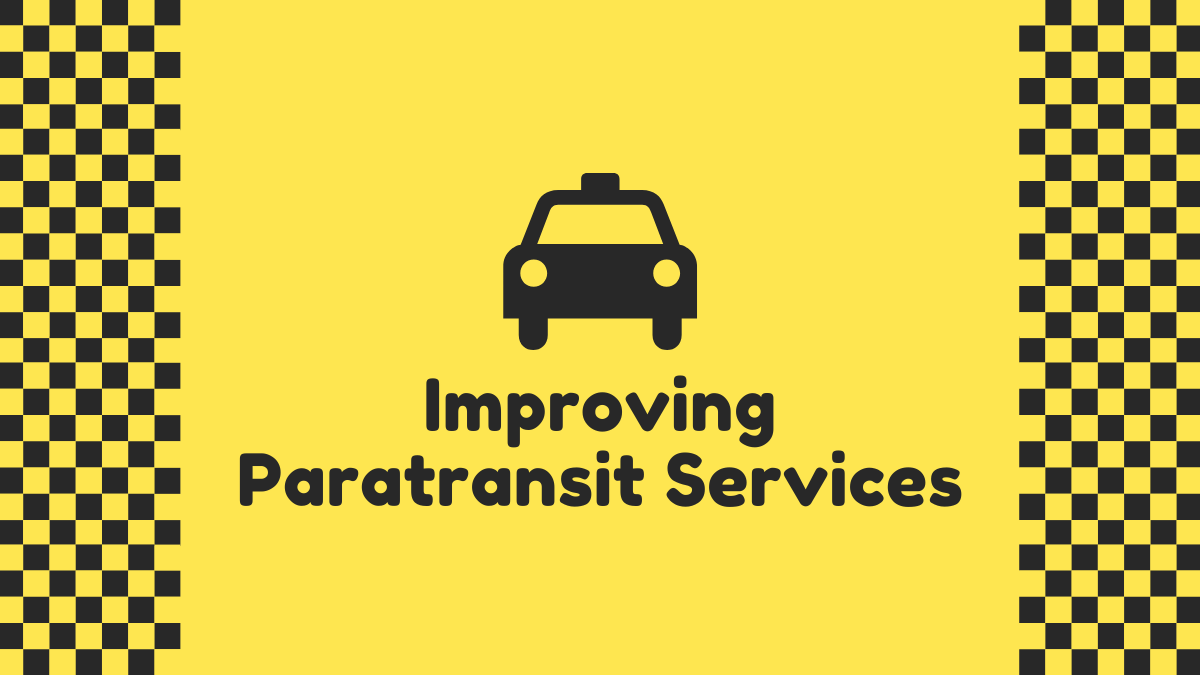 Many Americans with and without disabilities use fixed-route transportation like a city bus or commuter rail to reach their desired destination. However, people with disabilities may need additional transportation assistance to reach destinations beyond traditional public transportation routes. Public transit authorities provide paratransit services for eligible persons with disabilities if they cannot safely travel short distances to a bus stop. For instance, minibuses are used for these purposes. However, there can be issues with the timeliness of these services and the limited distance that is covered.
Many Americans with and without disabilities use fixed-route transportation like a city bus or commuter rail to reach their desired destination. However, people with disabilities may need additional transportation assistance to reach destinations beyond traditional public transportation routes. Public transit authorities provide paratransit services for eligible persons with disabilities if they cannot safely travel short distances to a bus stop. For instance, minibuses are used for these purposes. However, there can be issues with the timeliness of these services and the limited distance that is covered.
Federal law requires city transportation authorities to provide paratransit for eligible people with disabilities within three-quarters of a mile of the fixed route of a city bus or commuter rail. Transportation authorities are not required to provide paratransit services beyond these limits but may extend services. This regulation aims to enable people with disabilities to reach their destinations safely but creates challenges depending on the location. [continue reading…]
Celebrating Radical Dreams
 June is Pride Month, a month of profound and unending gratitude for me. I am an openly queer and disabled clergy person. Without the radical dreaming and action from our queer and disabled ancestors, my path would not be possible.
June is Pride Month, a month of profound and unending gratitude for me. I am an openly queer and disabled clergy person. Without the radical dreaming and action from our queer and disabled ancestors, my path would not be possible.
Disability and Queerness have always been intertwined, from the Diagnostic and Statistical Manual (DSM) classifying homosexuality a mental illness, to Acquired Immune Deficiency Syndrome (AIDS) disabling millions of queer community members. In the disability community our love and embodiment has always been queer. Our communities know how to love and embrace people and lifestyles that do not fit the norm.
I am named after a disabled and queer uncle who passed away from AIDS in the 1980s. He was a committed advocate against discrimination toward queer people with AIDS in the workplace. His death was the catalyst for my grandparents to join our LGBTQ affirming church. While there, they created AIDS support groups at the church, and slowly became surrogate parents for many queer people whose families had abandoned them. [continue reading…]
RespectAbility Honors Elizabeth Kim and Nicole Homerin with the 2023 Justin Chappell Memorial Award and Steve Bartlett Award
Los Angeles, CA, June 14 – For the second year, RespectAbility is proud to announce the recipients of its annual awards recognizing individuals working to advance opportunities for people with disabilities. Elizabeth Kim is the recipient of the 2023 Justin Chappell Memorial Award and Nicole Homerin is the 2023 Steve Bartlett Award recipient. Each will receive $1,000 and be honored on stage at RespectAbility’s 10th Anniversary Celebration, sponsored by Wells Fargo, in Los Angeles on July 27. [continue reading…]
Data Corner for May 2023
Asian American & Pacific Islander Heritage Month
In celebration of Asian American and Pacific Islander Heritage Month, RespectAbility recognizes the contributions of Asian Americans and Pacific Islanders (AAPI) to our society.
According to the Annual Disability Statistics Compendium, there are 18,814,944 Asian Americans living in the United States. Out of that number, 1,454,941 have disabilities. The states with the largest population of Asian Americans with disabilities are California and New York, which have 509,446 and 131,682 of AAPI with disabilities in residence, respectively.
A 2021 report from the New American Economy research fund found that the AAPI community is the fastest-growing minority group in the United States. In the last decade, the AAPI community grew by 25.5%, contributing to about 20% of the total population growth in the country. In 2019, AAPI households brought in $783.7 billion and were able to contribute $167.9 billion in federal taxes, and $72.5 billion in state taxes. However, according to the same report, the AAPI community still had about $543.4 billion in purchasing power after taxes.
This is the very definition of a growing and thriving community, and yet it is clear that stigma and bias continue to result in under-diagnosis of disabilities in the community, leading to gaps in outcomes. [continue reading…]




